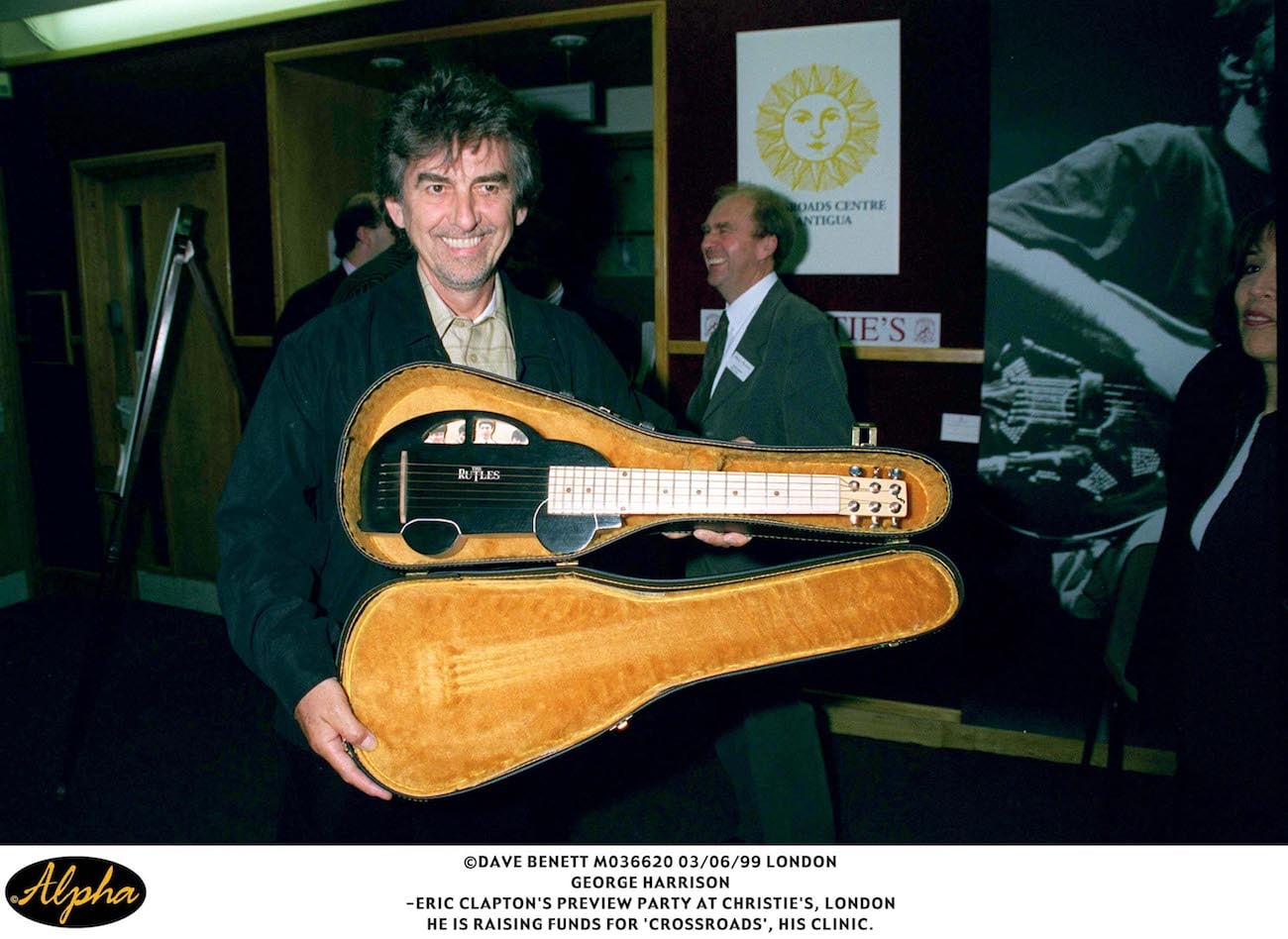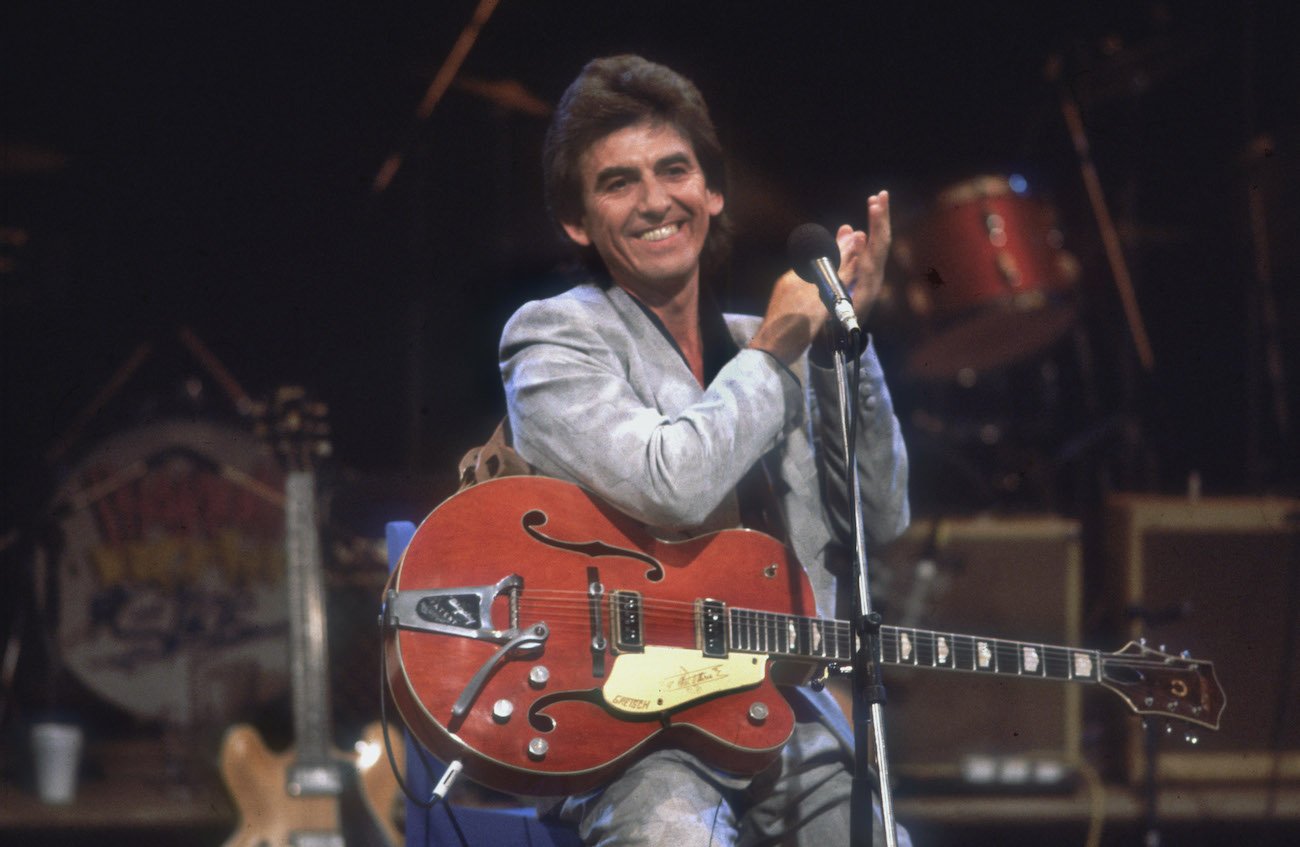
George Harrison Carried a Ukulele Banjo With Him at All Times Because of Its Funny Sound: ‘It Makes You Laugh When You Hear It’
George Harrison liked carrying a ukulele banjo around with him at all times because its sound made people laugh. The former Beatle was already so charismatic he didn’t need the instrument to make people feel good. Still, the ukulele banjo allowed him to jam with friends as well.

George Harrison loved the ukulele banjo because of George Formby
According to Ukulele magazine, George wouldn’t have fallen in love with the ukulele without George Formby, who popularized the instrument in England in the 1920s. At one point, Formby was the highest-paid performer in the country, and everyone knew about him.
In 1992, George told Timothy White (per George Harrison on George Harrison: Interviews and Encounters) that Formby wasn’t exactly a massive influence on him as a child. However, growing up, he couldn’t escape Formby’s music.
“There was a guy in England called George Formby—it’s a peculiar north-of-England style of singing where he came from, not far from Liverpool,” George explained. “He played a ukulele banjo… He wasn’t that much of an influence on me. It’s just that you couldn’t escape him growing up in England around the ’40s and ’50s.”
George only started playing the ukulele religiously in the 1980s. Then, he couldn’t ever put the instrument down.
George carried a ukulele banjo around with him because of its funny sound
Sometime in the 1980s, George started carrying around a ukulele banjo.
He told White, “But I got into the ukulele banjo, an amazing little instrument. I recorded with it on some stuff I haven’t got out yet; I’ve written a few songs with it. I carry one around because it’s such a funny instrument; it makes you laugh when you hear it.
“It’s very limited [as] to what you can do, although there are players who can play classical stuff on it. I’ve seen people play, like, the ‘William Tell Overture’ on the ukulele banjo. For me, it’s the narrowness of the chords. You play all these little basic chords, and there are only four strings, and they’re all around the same positions, but it gives you a kind of an interesting way of looking at the same chords you know from the guitar.
“It’s the same tuning as the guitar. It’s a high sound because in the fourth string, instead of it being low, it’s actually an octave above where it would be on the guitar… When you mix it in with Wilbury music, it’s actually a neat sound.
“The song I’ve made a demo of is one of the old records of this George Formby, but the version I’ve done of it is more like an early Ry Cooder tune. And I’ve spent some time in Hawaii and been influenced by the ukulele. Basically, the ukulele is just a little tiny guitar that you can put in your pocket. They have a sweet sound to them.”
The ukulele banjo interested George specifically because of its historical significance. He explained that the Portuguese brought the cavaquinho with them when they went to Hawaii in the 1800s. George said, “And the king of Hawaii, King Kamehameha, saw these people playing and he said, ‘Ukulele!’ Uku means ‘flea,’ and lele means ‘to dance.’ So he was commenting on how quick their fingers were going, like a dancing flea.”
Then, people spread ukuleles all over the world. Kelvin Keech was the first person to combine the ukulele and the banjo as the banjolele or the ukulele banjo. “I wanted to get some, and I found out they were only made between 1926 and 1932,” George said.
In 1990, George joined the George Formby Society. In All About the Banjo Uke, the president of GFS wrote that he’d restored George’s gold-plated and engraved Ludwig banjo uke. When George collected it, “he was like a kid at Christmas and couldn’t contain his excitement at the lovely condition of his restored Ludwig.”
During the GFS meeting, George told the BBC, “The best thing about it for me is it’s just funny music. It’s very lighthearted. It’s hard to play a ukulele banjo without smiling. It tends to lighten your life a bit.”
The former Beatle loved playing the instrument with his friends
George didn’t just use the ukulele banjo to make people laugh with its lighthearted sound. He used the instrument to jam with his friends.
When Joe Brown visited George, all they did was play the ukulele. George would instruct Brown to bring a suitcase of them. “We’d play all over,” Brown said.
Later, George worked with ELO frontman Jeff Lynne on Cloud Nine. Soon, George and Lynne bonded over the instrument too.
“The first time I met George was in his garden at his lovely house,” Lynne told Ukulele magazine. “About two hours later, he’d given me this old Wendell Hall ukulele; it was actually a banjolele. We’d strum every day—we’d have at least a half-hour or 15 minutes on the uke or banjolele. And then other people would come over to Friar Park and they’d want to join in and have a go, and sometimes we’d have four people playing ukes in sync. It was like a ukulele orchestra!”
Something similar happened with Tom Petty. He said, “He showed up [at my house] one day and gave one to me. ‘You gotta play this thing; it’s great! Let’s jam!’ I had no idea how to play a ukulele. ‘Aw, it’s no problem, I’ll show ya!’ So we spent the rest of that day playing ukuleles. My wrist hurt the next day.
“When he was leaving, I walked out to the car and he says, ‘Wait, I want to leave some ukuleles here!’ And he’d already given me one. ‘We may need more!’ He opened the trunk and he had a lot of ukuleles in the trunk. And I think he left four at my house, and he said, ‘Well, you never know when we might need ’em, because everyone doesn’t carry one around.”
George also bonded with his former brother-in-law, Fleetwood Mac’s Mick Fleetwood, over the instrument. He also once surprised actor Michael Caine by playing the instrument late into the night. That was usual for George. Petty said George could “clear rooms” with his late-night playing. It seemed as if he never stopped playing it.
When George was dying in 2001, Lynne visited him for the last time and tried making him more comfortable with the soft notes of the ukulele. Lynne thinks George heard it. The light-hearted notes ushered George into another plane of existence.


